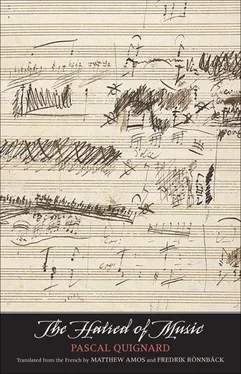In the Hypogeum cave, women’s and children’s voices cannot make the stone instrument resound, the frequency of their voices not being low enough to set the rocky resonance going.
Only boys whose voices have changed can make the Hypogeum cave resound.
Changing voice, dying and being reborn: the funerary or nocturnal journey and juvenile initiation are inseparable. Propp said that all the world’s fantastic tales recounted this initiation journey: returning home bearded and hoarse.
What is a hero? Neither a living nor a dead person. A shaman who enters the other world and who returns.
A changed person.
It is coming back from the cave, from the jaws of the animal that swallows, tears to pieces, that is to say incises, and spits out into the sunlight.

Since the zoological emergence, three million years separate us from weapon-tools made of stone. Then forty thousand years of prehistory. Finally nine thousand years of history, which is nothing but infinite war. Humans coming out of prehistory, at the very beginning of the Neolithic, tearing time apart to the point where they could plan the year, considered plants, animals, humans as breeders. They sacrificed the first fruits, the firstborn of their herds and of their own kind. They castrated.
Osiris is torn apart and emasculated. The fourteenth piece of his body, nowhere to be found, is his sex. During the Osiris processions, women musicians would sing his hymn in his honor while moving with strings the obscene marionettes of their god. Attis tears off his penis under a pine and splatters the earth with blood. The ritual was accompanied by tambourines, cymbals, flutes, and horns. The hymns of the eunuch priest colleges of Attis were immensely renowned all over the Orient. The musician Marsyas, having picked up the flute thrown away by Athena, was bound to a pine and emasculated, then flayed. The Greeks would go to see his skin at Celaenae, in the historical era, in a cave, at the foot of the citadel. They said that his skin would still quiver, as long as the aulete played his flute well. Orpheus is emasculated and torn apart. Music and the marvelous voice, the domesticated voice, castration are bound together.

Death is hungry. But death is blind. Caeca nox . Dark night means blind night, unseeing.
As night, the dead can recognize only by the voice.
In the night, orientation is acoustic. In the depths of caves, in the absolute and nocturnal silence in the depths of caves, the white, golden calcite curtains, serving as lithophones, are broken at the height of a human being.
The broken stalagmites and stalactites were transported, in the prehistoric era, out of caves. They are fetishes.

The Greek geographer Strabo reports that in the depths of the Corycian cave, two hundred feet from its entrance, under the dripping stalactites, where the subterranean spring spouted and then disappeared with a rumble into a fissure, in the most complete darkness, the pious men of Greece would hear cymbals played by the hands of Zeus.
Strabo adds that other Greeks, in the first century Before Christ, affirmed that it was the mashing of the jaws of Typhon, Stealer of Bear Nerves.

In the eighteenth century of our era, Jan de l’Ors (Jean of the Bear) securely fastens the rope under his arm. He descends to the bottom of the well. The hole continues vertically into the earth so far that he cannot see the bottom. The walls are slimy. Bats silently take flight in the darkness. The descent lasts three full days.
At the end of the third day, his forty-quintal stick touches the bottom of the earth. Jan de l’Ors unfastens the rope. He takes a couple of steps in the immense cavern in which he has just landed.
A large pile of bones is strewn on the ground.
He treads between skulls.
He enters a castle in the middle of the cave. He walks but his steps no longer resonate.
Jan throws his forty-quintal stick on the marble floor: it makes the sound of a bird feather falling on snow.
Jan de l’Ors immediately understands that this castle is the land where sounds cannot be born.
He raises his head toward a gigantic cat made of calcite, luminous glass, crystal. The great cat wears on its forehead a carbuncle blazing in the darkness. Everywhere are trees full of golden apples surrounding a silent fountain: the water spouts and falls without a sound.
Sitting on the edge of the fountain, a young girl, as beautiful as dawn, combs her hair with a crescent moon.
Jan de l’Ors approaches her but she does not see him. The eyes of the marvelous young girl remain irresistibly fixed on the flames of the carbuncle that holds the place under its charm.
Jan wants to speak to her: he asks his question but his question does not resonate.
“The woman is bewitched,” Jan de l’Ors thinks, “and I’m going to go mad in this deathly silence.”
So Jan picks up his forty-quintal stick, brandishes it, and strikes the head of the great crystal cat.
All the stalactites break, emitting the world’s most beautiful song. The imprisoned sounds are suddenly set free. The fountain murmurs. The slabs resonate. The leaves rustle on the tree branches. The voices speak.
Fifth Treatise. THE SONG OF THE SIRENS
In book IX of the Odyssey , Ulysses, breaking down in tears, confesses his name. The bard puts down his cithara and falls silent. From then on Ulysses speaks in the first person and tells the rest of his adventures: first the cave, then Kirkè’s island, finally his journey to the land of the dead.
Returning from the land of the dead, Ulysses sails along the coast of the island of the Sirens.
Kirkè means bird of prey, Sparrowhawk. Circe sings on the island Aiaiè. Aiaiè in Greek means Moan. Kirkè sings a moaning and languorous song and her song transforms whoever hears it into a pig. Circe the singer has warned Ulysses: the shrill, piercing ( ligurè ) song ( aoidè ) of the Sirens pulls ( thelgousin ) men: it attracts and binds whoever hears it in fascination. The Sirens’ island is a humid meadow ( leimōni ) surrounded by human bones covered in rotting flesh. The two ruses revealed to Ulysses by the sparrowhawk shaman are as simple as they are precise. Each one of Ulysses’ men must plug both his ears with kneaded wax, removed from a honeycomb with the help of a bronze knife. Ulysses alone is allowed to keep his ears open on condition that he be bound with ropes three times: hands bound, feet bound, and, standing on deck, his thorax bound to the mast.
Each time Ulysses asks to be released, Eurylokhos and Perimedes will tighten the ropes. He can then hear what no mortal has heard without dying: the scream-songs (at the same time phthoggos and aoidè ) of the Sirens.

The end of Homer’s scene is more inconsistent.
When silence has returned to the sea, it is in all likelihood the sailors, whose ears are plugged, who hear the Sirens’ song fading in the distance, since it is agreed that if Ulysses were to ask that the ropes be loosened, they would only be tightened by Eurylokhos and Perimedes. In short, the sailors, whose ears are plugged, upon hearing the silence, hasten to remove from their ears the pieces of wax that Ulysses had cut with his bronze knife and kneaded with his fingers.
Читать дальше













